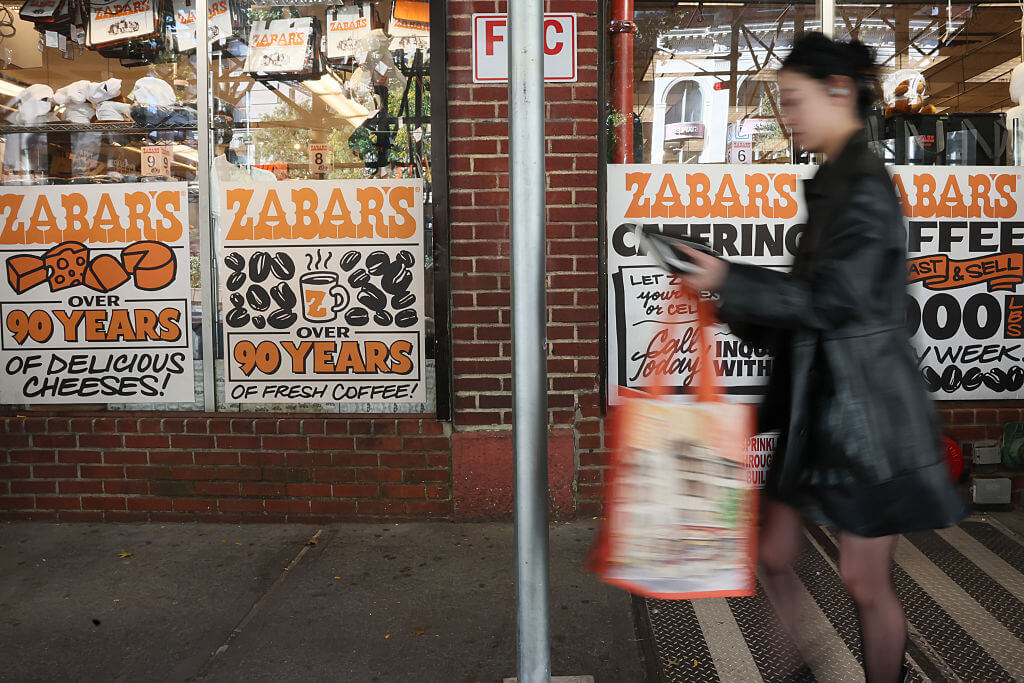Zabar’s devoted fans mourn Saul Zabar, who transformed his family’s Jewish grocery into an NYC institution
For more than seven decades, Zabar led his family’s famed Jewish market, beloved for its bagels, smoked fish, and classic Ashkenazi fare

The Zabar food emporium is seen on October 8, 2025 in New York City. Photo by Michael M. Santiago/Getty Images
(JTA) — Perhaps the only local issue to unite Jews and non-Jews, Zionists and anti-Zionists and progressives and conservatives in New York City is a love for the Upper West Side emporium Zabar’s.
Their remarkable unity was on display this week after Saul Zabar, who led his family’s famed grocery store for over seven decades and helped make it a cornerstone of Jewish culture in New York City, died at 97.
“A true New York legend. He gave the city lox, love, and a place to argue over babka,” wrote New York City Mayor Eric Adams in a post on X. “Zabar’s isn’t just a store, it’s a slice of NYC soul. May his memory be a blessing.”
“I grew up going to Zabar’s. So many of my childhood memories center around the best lox in NYC (which is saying something),” tweeted Zohran Mamdani, the progressive who is vying to succeed Adams and who was raised on the Upper West Side. “With Saul Zabar’s passing today, the Upper West Side has lost a legend who turned his parent’s humble store into a culinary institution.”
Rep. Jerry Nadler, who famously toted a Zabar’s bag containing “a babka and the constitution” to an impeachment hearing he was leading in Congress, tweeted, “The UWS and New York City lost one of the greats today. Saul Zabar built an institution that has supplied New Yorkers, including myself, with lox, babka, and whitefish for decades. My condolences to the Zabar family and may his memory be a blessing.”
Born in 1928 to Jewish immigrant parents Louis and Lillian Zabar, who established Zabar’s in 1934 as the smoked fish department of a supermarket, Saul Zabar initially set out to become a doctor.
But those plans were cut short in 1950 when his father died at 49, and Zabar and his brother, Stanley, stepped in to run the store alongside Murray Klein, who joined the store in 1953.
As the grocery’s president and principal owner, Zabar took a hands-on approach to the store’s counters, where the Manhattan storefront serves some 2,000 pounds of smoked fish and 8,000 pounds of coffee each week to roughly 40,000 customers, according to The New York Times.
“Money is not why we do this, not why we’re here seven days a week. It’s a way of life for us. It’s kind of old-fashioned,” Zabar told Edible Manhattan in 2012
Today, the iconic Jewish market features a wide array of classic Ashkenazi foods, from bagels and babka to fish salads, pickles, deli meats, and the family’s signature rugelach. Every year, Zabar’s sells 400,000 pounds of its signature coffee blend.
“Saul’s passing marks the end of an era, but his legacy lives on in every bagel, every slice of smoked fish, every cup of coffee, and every conversation that fills our store each day,” wrote Zabar’s in the post on Instagram announcing his death.
Unlike many of its early contemporaries that closed as classic Jewish fare fell out of favor, Zabar’s has adapted to win new fans. The store made appearance in Meg Ryan and Tom Hanks’ film “You’ve Got Mail” as well as on “Seinfeld.” This year, for example, the 91-year-old store collaborated with Adidas in a shoe launch to celebrate the U.S. Open and with Nordstrom to pay homage to its loyal Jewish customers.
Zabar died in a hospital after being admitted for a brain bleed, his daughter Ann told the New York Times.
He is survived by his wife, Carole Ann Kishner, who he married in 1968, and his children Ann, Aaron and Rachel Zabar, along with four grandchildren.















